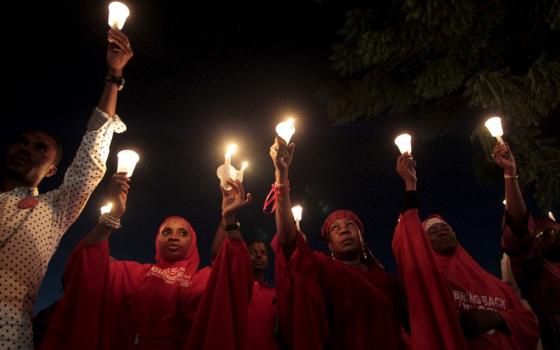Two years ago, we marveled at the power of social media, in awe of how something as simple as a hashtag like #BringBackOurGirls seemed to unite the world.
On April 14, 2014, Boko Haram militants stormed the town of Chibok, Nigeria, and kidnapped 276 girls, threatening to sell them into sexual slavery or make them "wives" of Boko Haram fighters.
The news — and the shock and outrage — went viral. The entire world, it seemed, was demanding the girls' return.
Two years later, only 57 of those girls are known to have escaped. But the missing girls — and what has happened in the region since — seems to have escaped the world's notice.
According to a new report by the United Nations International Children's Emergency Fund, UNICEF, thousands of other children have disappeared, not only in Nigeria, but also in Chad, Niger and Cameroon. Some have been exploited, some have been used as suicide bombers, and no one knows what has happened to the rest.
The targeting of children has sparked 2.3 million people to flee their homes in fear of Boko Haram. Of those, 1.3 million are children — the U.N. says this is one of the fastest growing displacement crises in Africa.
Life on the run, the report says, is rough: In northeast Nigeria, about 90 percent of those displaced are being sheltered in some of the world's poorest communities, further straining already stretched resources.
The children who are kidnapped face a living hell: girls are subject to sexual abuse, sexual violence and forced marriages; boys are forced to attack their own families to prove their loyalty to Boko Haram.
There were 151 suicide attacks last year, the report says — and one in five of those used a child. Three-fourths of those children used were girls.
This new, horrific tactic has worsened an already terrible situation: Those women and girls who have escaped Boko Haram's clutches were often shunned, especially if they were pregnant with Boko Haram offspring. But now, because of the suicide bombings, they are not only shunned but feared.
"Let us be clear: these children are victims, not perpetrators," Manuel Fontaine, UNICEF Regional Director for West and Central Africa, said in a statement about the report. "Deceiving children and forcing them to carry out deadly acts has been one of the most horrific aspects of the violence in Nigeria and in neighboring countries."
This has turned communities against themselves.
"As 'suicide' attacks involving children become commonplace, some communities are starting to see children as threats to their safety," Fontaine said. "This suspicion towards children can have destructive consequences; how can a community rebuild itself when it is casting out its own sisters, daughters and mothers?"
The Independent interviewed some of Boko Haram's victims, who talked about being victimized again after their escape:
Another survivor, Aisha, told International Alert how she became pregnant after she was raped by a Boko Haram fighter. 'I felt helpless and felt they had ruined my life, and no one would now take care of me . . . I hated the baby.
. . . [In a government camp], the women called me "Boko Haram wife" and wouldn't let me use their belongings. A group of them even beat me up,' she said.
UNICEF says about 1,800 schools are closed because they've been burned down, looted or used as shelter by displaced people.
The Independent reports that the U.N. has urged the Nigerian government to do more to find and rescue the Chibok girls, but there has been little progress, even after American and British drones located a group of up to 80 captives. The newspaper said no attempt to reach them had been made.
Remember, links, tips and accounts of the response to any crisis anywhere in the world are always welcome at [email protected].
[Dan Stockman is national correspondent for Global Sisters Report. Follow him on Twitter @DanStockman or on Facebook.]

